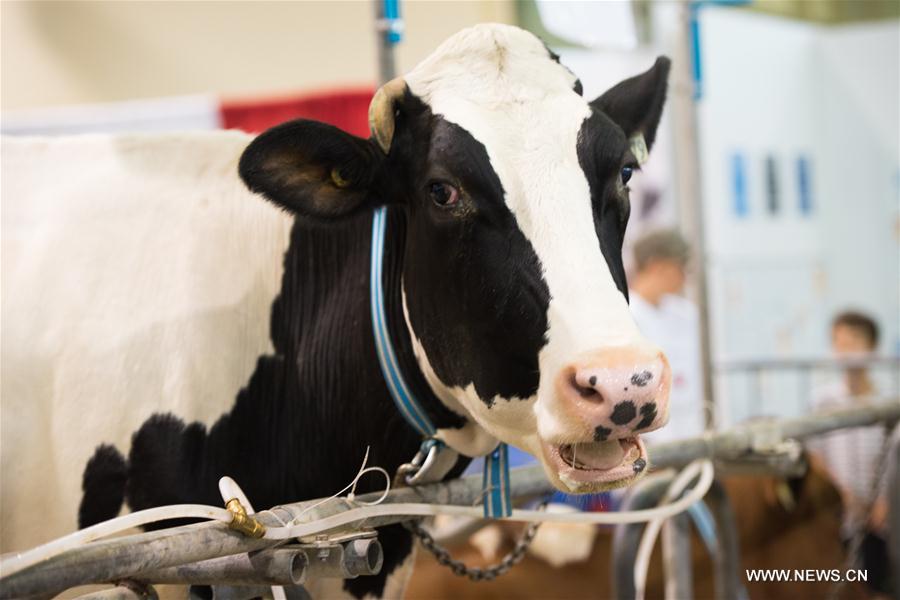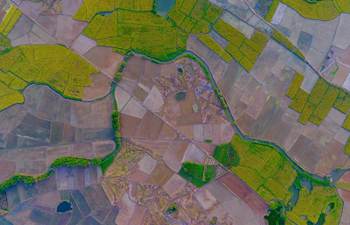
An Ontario milk cow is seen at Canadian National Exhibition in Toronto, Canada, on Aug. 18, 2017. The United States opened the 23-year-old North American Free Trade Agreement (NAFTA) renegotiations Wednesday with a declaration that it wants major changes to the agreement that shifts the balance of trade. However, Canadian business owners are hoping U.S. negotiators will be receptive to maintaining, if not improving, the current flow of goods and workers across the border. Although the Canadian dairy industry was excluded from the original NAFTA deal in 1994, its supply management system for dairy has long been a point of contention with the United States. U.S. President Donald Trump has vowed to push Canada for greater access to its markets for American dairy products in the NAFTA talks. (Xinhua/Li Haitao)
OTTAWA, Aug. 19 (Xinhua) -- The United States opened the 23-year-old North American Free Trade Agreement (NAFTA) renegotiations Wednesday with a declaration that it wants major changes to the agreement that shifts the balance of trade.
However, Canadian business owners are hoping U.S. negotiators will be receptive to maintaining, if not improving, the current flow of goods and workers across the border.
Raymond Yu, a senior media professional told Xinhua ensuring the current flow of products and skilled personnel is a very realistic prospect in the NAFTA talks and is important to the economies of Canada and the U.S.
He said the two countries have a very deeply connected supply chain, and employees flowing from one facility on one side of the border to another is very important to make sure that things run quickly and smoothly.
Andy Soong, a Ottawa businessman told Xinhua that there is a risk the U.S. will want to change the rules of origin and content requirements, affecting tariffs and the bottom line.
He said the current trade agreement is working well for Canada. "Of course, Canadian business people, especially in auto industry, have some great concerns about it, there's no question."
Although the Canadian dairy industry was excluded from the original NAFTA deal in 1994, its supply management system for dairy has long been a point of contention with the United State.
U.S. President Donald Trump has vowed to push Canada for greater access to its markets for American dairy products in the NAFTA talks.
David Hans, a dairy farmer in Ontario told Xinhua that there is a lot of inaccuracy in the perception of unfairness on Canada's part.
He voiced his wish that Canadian dairy industry would remain out of NAFTA and that U.S. producers turn their focus on their domestic policies to control their problems with overproduction.
The U.S. dairy industry is reportedly unhappy that Canadian producers get profits from price controls, and then could sell skimmed-off higher protein components for cheese-making at lower market prices, squeezing Americans out of a growing market.
Hans is also anxious that the renegotiations may affect the price. Depite before NAFTA talks, Canada's Foreign Affairs Minister Freeland vowed to defend supply management on Canadian farms in the NAFTA negotiations.
Canada's dairy, egg and poultry industries are governed by a supply-management system that dates back to the 1970s. It has three parts: fixed prices, production quotas and tariffs to protect Canadian producers from foreign competition.
While the system reaches across the country, the overwhelming majority of farmers within the supply-managed system are in Ontario and Quebec. In dairy, the most valuable supply-managed sector, fully two-thirds of production is in Ontario and Quebec.
By contrast, concern that the defence of supply management will cost other sectors is most evident across the prairies provinces in the country.
Some Canadian observers said the worry that protecting supply management will come at a cost to Canada, and potentially to other farm groups, is quite reasonable.
"It is likely other Canadian farmers will pay the price," said Alexandre Moreau, public policy analyst at the Montreal Economic Institute. "Trump has promised increased market access to U.S. dairy farmers, he has directly taken aim at Canada's supply management. This is about politics."
Feuds over softwood lumber also have been a recurring part of Canada-U.S. relations since the 1980s. Their root cause is U.S. industry's contention that Canada unfairly subsidizes its lumber by providing cheap access to public land. It's led to a cycle of American punitive action, followed by trade cases mostly won by Canada, and then a compromise settlement.
The fifth and most recent lumber war was set off on April 24 this year when U.S. Commerce Secretary Wilbur Ross said the U.S. would impose new anti-subsidy duties on Canadian softwood. The initial duties added up to about 20 per cent, but a second wave of anti-dumping duties in late June brought that total to about 27 per cent.
Early this month, the Canadian Federation of Independent Business said there is real concern among its members that any changes to NAFTA could have significant effects on their ability to sell goods and services abroad.
It is worried that its members will have to increase their prices if tariffs go up under a renegotiated NAFTA.
The federation said uncertainty in how the trading partners will have to do business makes it difficult for Canada's small business owners to plan for the future.
In releasing its response to the start of the NAFTA talks, the federation quoted a farming business owner in British Columbia province as saying, "we are hoping that NAFTA remains relatively the same."
All business people know that negotiations are a process of give and take game, said Yu.
"If the Americans give us supply management, and allow Canada to protect areas like dairy, what are they going to take?" he asked. "Who can make sure there are no unintended consequences?"















